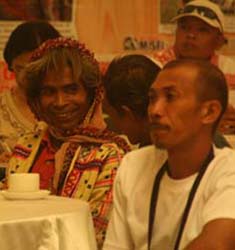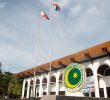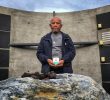DAVAO CITY — A European Union (EU) envoy urged both the government and armed insurgent groups to look for more options to get the stalled peace negotiations back on track.
“It (peace negotiations) didn’t work, so far; so, they need to do more,” said Johan Snijckers, deputy head of contracts and finance of the European Commission delegation to the Philippines. “We think that parties have made quite some effort.”
Snijckers, who was in Davao for the culmination of the EU-funded project Action Repair, said that both parties need to get together again to see what the options are; and, if possible, explore new ones.
But Snijckers refused to specify whether he was referring to the Communist-led National Democratic Front (NDF) or the Moro Islamic Liberation Front (MILF).
The NDF walked out of the peace agreements with the GRP in 2004 to protest the inclusion of the Communist Party of the Philippines (CPP), its armed wing New Peoples Army (NPA) and NDF chief political consultant Prof. Jose Maria Sison in the terror list of the European Union (EU) and the United States (US). The probability of talks resuming dwindled when the government introduced the DDR (disarmament, demobilization and reintegration). Talks with the MILF also bogged down in August last year when the Supreme Court ruled as unconstitutional the memorandum of agreement on ancestral domain (Moa-AD) which would have led to the formation of the Bangsamoro Juridical Entity (BJE), meaning wider territory and an expanded administrative capacity of the present Autonomous Region in Muslim Mindanao (ARMM).
Both the government and the NDF recently expressed openness for renewed talks. Executive secretary

Lumads at the culminating activity of the European Union-funded Action Repair. The program helped rebuild communities ravaged by conflicts and natural disasters. (davaotoday.com photo by Barry Ohaylan)
Eduardo Ermita said Malaca�ang hoped to complete the peace process before President Gloria Macapagal-Arroyo’s term ends next year. Negotiations with the NDF were set to resume by the end of this month but were postponed. The NDF said the GRP failed to comply with an agreement to release illegally imprisoned members, including the consultants and staff of the peace panel. As of August 17, the NDF reported 22 panel negotiators and consultants who are still detained. Malaca�ang said talks will resume in Oslo, Norway in October.
Talks with the MILF scheduled for August 10 were also moved to the third week of this month. According to the statement
from the MILF official website, talks were postponed in order to attend to the wake of former President Corazon Aquino.
Snijckers said that the European Union does not believe in fighting because there are no winners in war, only victims. He said they believe in dialogues as key to attaining peace. “The people don’t have to pay the price for this,” Snijckers said.
The EU has been following developments on the peace talks, referring to a statement released by the Presidency of the European Union in September of last year concerning the situation in Mindanao. The European Union urged the MILF and the Government of the Republic of the Philippines (GRP) to return to the negotiating table and seek a lasting solution to the conflict.
In March this year, the European Parliament further approved a resolution volunteering to facilitate peace negotiations in the Philippines, if requested; also vowing to support the Malaysia-led International Monitoring Team (IMT), which monitors the implementation of the ceasefire between the military and the MILF. The last members of the IMT left the Philippines in November last year. The government has yet to finalize a new team, with ongoing debates as to whether Malaysians or Indonesians are better fit to head the new group.
Snijckers was in Davao City to attend a peace gathering of Mindanao tri-people — Lumads, Moros, and Christians — during the culmination of the EU-funded Action Repair project of the Mindanao Interfaith Services Foundation Inc. (Misfi).
The Action Repair was a 2-year capability-building project implemented in 39 communities in five regions in Mindanao. Misfi said that project beneficiaries totalled 4,648 families or some 28,392 individuals. (CJ Kuizon/ davaotoday.com)










